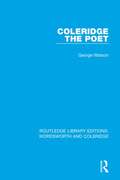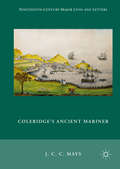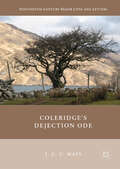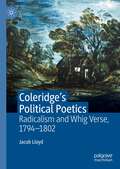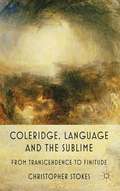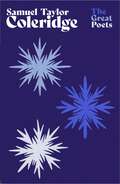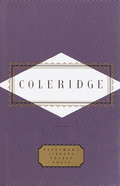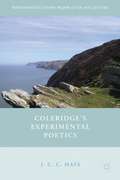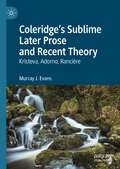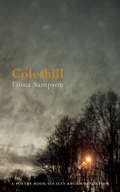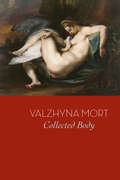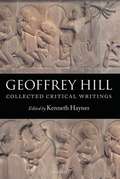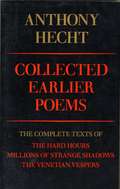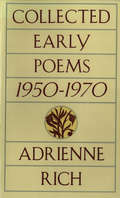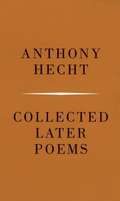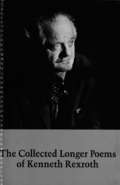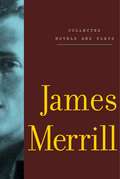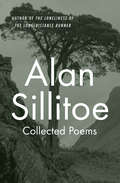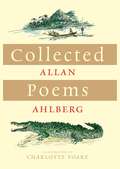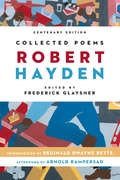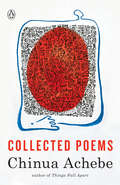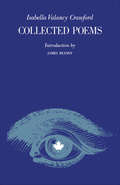- Table View
- List View
Coleridge the Poet (RLE: Wordsworth and Coleridge #11)
by George WatsonFirst published in 1966. Despite the intense interest in Coleridge in the twentieth century, this book represents the first study of Coleridge’s poetry to be published in Britain. It is also the first to be based upon the conclusion that Coleridge’s greatness as a poet is a matter of achievement rather than aspiration and to argue that his literary career was nearly half a century long, consisting of more than just well-known texts like The Ancient Mariner and Kubla Khan. The author argues the formality of the romantic achievement and its success in creating whole and fully realised poems in the established literary kinds.
Coleridge's Ancient Mariner (Nineteenth-Century Major Lives and Letters)
by J. C. C. MaysThis is the first book-length study to read the "Ancient Mariner" as "poetry," in Coleridge's own particular sense of the word. Coleridge's complicated relationship with the "Mariner" as an experimental poem lies in its origin as a joint project with Wordsworth. J. C. C. Mays traces the changes in the several versions published in Coleridge's lifetime and shows how Wordsworth's troubled reaction to the poem influenced its subsequent interpretation. This is also the first book to situate the "Mariner" in the context of the entirety of Coleridge's prose and verse, now available in the Bollingen Collected edition and Notebooks; that is, not only in relation to other poems like "The Ballad of the Dark Ladiè" and "Alice du Clós," but also to ideas in his literary criticism (especially Biographia Literaria), philosophy, and theology. Using a combination of close reading and broad historical considerations, reception theory, and book history, Mays surveys the poem's continuing life in illustrated editions and educational textbooks; its passage through the vicissitudes of New Criticism and critical theory; and, in a final chapter, its surprising affinities with some experimental poems of the present time.
Coleridge's Dejection Ode (Nineteenth-Century Major Lives and Letters)
by J.C.C. MaysColeridge's Dejection Ode completes J.C.C. Mays’ analysis of Coleridge’s poetry, following Coleridge’s Ancient Mariner (Palgrave 2016) and Coleridge’s Experimental Poetics (Palgrave 2013). "Dejection: An Ode" stands alone in Coleridge's oeuvre: written at a time of personal crisis, it reaches far back and deeply into his thinking in an attempt to find a poematic solution to ideas and problems he had mulled over for a long time. Mays reveals how the poem also marks the opening of the second half of Coleridge's career as both poet and thinker. In three central chapters Mays examines the new style that evolved in the process of writing the Ode: the technical means of metrics, rhyme and grammar; language and allusion; and symbol and structure. He recounts the complex, sometimes controversial critical history of the Ode, and suggests an editorial solution to the problem created by the Letter to Sara Hutchinson; re-evaluates the position of Wordsworth in the poem apropos the political statement it makes; clarifies the distinction between the views on Imagination expressed and those contained in Biographia Literaria; and traces the links of the concept "dejection" as it underpins Coleridge's late poems.
Coleridge's Political Poetics: Radicalism and Whig Verse 1794 - 1802
by Jacob LloydThis book considers Samuel Taylor Coleridge’s engagement with ‘Whig poetry’: a tradition of verse from the eighteenth century which celebrated the political and constitutional arrangements of Britain as guaranteeing liberty. It argues that, during the 1790s, Coleridge was able to articulate radical ideas under the cover of widely accepted principles through his references to this poetry. He positioned his poetry within a mainstream discourse, even as he favoured radical social change. Jacob Lloyd argues that the poets Mark Akenside, William Lisle Bowles, and William Cowper each provided Coleridge with a kind of Whig poetics to which he responded. When these references are understood, much of Coleridge’s work which seems purely personal or imaginative gains a political dimension. In addition, Lloyd reassess Coleridge’s relationship with Thomas Percy’s Reliques of Ancient English Poetry, to provide an original, political reading of ‘The Rime of the Ancyent Marinere’. This book revises our understanding of the political and poetic development of a major poet and, in doing so, provides a new model for the origins of British Romanticism more broadly
Coleridge, Language and the Sublime
by Christopher StokesTraversing the themes of language, terror and representation, this is the first study to engage Coleridge through the sublime, showing him to have a compelling position in an ongoing conversation about finitude. Drawing on close readings of both his poetry and prose, it depicts Coleridge as a thinker of 'the limit' with contemporary force.
Coleridge: Everyman's Poetry
by Samuel Taylor ColeridgeThe best of Samuel Taylor Coleridge's poems in a beautiful new gift editionSamuel Taylor Coleridge (1772-1834) was educated at Christ's Hospital, London and Jesus College, Cambridge. Close collaboration with Wordsworth resulted in joint production of the volume Lyrical Ballads in 1798, which contained Coleridge's 'The Rime of the Ancient Mariner', signposting the Romantic movement. After wintering in Germany in 1797-8 he settled in the Lake District, where he wrote the 'Letter' that turned into 'Dejection: An Ode' (1802). In later years Coleridge turned increasingly to prose, covering philosophical, political, religious and critical subjects, although new poems continued to appear in most years until his death.
Coleridge: Everyman's Poetry (Everyman's Poetry Ser. #Vol. 18)
by Samuel Taylor Coleridge John BeerThe best of Samuel Taylor Coleridge's poems in a beautiful new gift editionSamuel Taylor Coleridge (1772-1834) was educated at Christ's Hospital, London and Jesus College, Cambridge. Close collaboration with Wordsworth resulted in joint production of the volume Lyrical Ballads in 1798, which contained Coleridge's 'The Rime of the Ancient Mariner', signposting the Romantic movement. After wintering in Germany in 1797-8 he settled in the Lake District, where he wrote the 'Letter' that turned into 'Dejection: An Ode' (1802). In later years Coleridge turned increasingly to prose, covering philosophical, political, religious and critical subjects, although new poems continued to appear in most years until his death.
Coleridge: Poems
by Samuel Taylor ColeridgeSamuel Taylor Coleridge (1772-1834) was the master impresario of English Romanticism -- an enormously erudite and tireless critic, lecturer, and polemicist who almost single-handedly created the intellectual climate in which the Romantic movement was received and understood. He was also, in poems such as 'The Rime of the Ancient Mariner,' 'Christabel,' and 'Kubla Khan.' the most uncanny, surreal, and startling of the great English poets.
Coleridge’s Experimental Poetics
by J. C. C. MaysColeridge has been perceived as the youthful author of a few brilliant poems. Coleridge's Experimental Poetics argues that his poetry is actually a continuous process of experimentation and provides a new perspective on both familiar and unfamiliar poems, as well as the relation between Coleridge's poetry and philosophical thinking. Taking into account the 300 new poems published in 2001, this is the first complete poetic analysis of Coleridge's work.
Coleridge’s Sublime Later Prose and Recent Theory: Kristeva, Adorno, Rancière
by Murray J. EvansThis book explores the sublime in Samuel Taylor Coleridge’s later major prose in relation to more recent theories of the sublime. Building on the author’s previous monograph Sublime Coleridge: The Opus Maximum, this study focuses on sublime theory and discourse in Coleridge’s other major prose texts of the 1820s: Confessions of an Inquiring Spirit (wr. 1824), Aids to Reflection (1825), and On the Constitution of the Church and State (1829). This book thus ponders the constellations of aesthetics, literature, religion, and politics in the sublime theory and practice of this central Romantic author and three of his important successors: Julia Kristeva, Theodor Adorno, and Jacques Rancière.
Coleshill
by Fiona SampsonDeep in limestone country, at the corner of Wiltshire, Oxfordshire and Gloucestershire, lies the village of Coleshill.This haunting new collection from Fiona Sampson is a portrait of place, both real and imaginary; a dreamscape with its roots deep in the local soil.The poems hum with an evocative music of their own: there are hymns of the orchards, verses for walkers, songs for bees. These are slices of life and states of mind; poems of grief, fears and maledictions, but also of renewal, resurrections and the promise of spring.Coleshill emerges as a “parish of sun / and shade”; its darkness and light perfectly balanced. From the T.S. Eliot and Forward Prize shortlisted poet comes a deep, interrogative collection of astonishing clarity and power.
Collected Body
by Valzhyna Mort"Mort is a fireball. . . . Personal, political, and passionate, Mort's poetry will surely sustain many reading audiences. Highly recommended."-Library Journal"A one-of-a-kind work of passion and insight."-Midwest Book Review"Mort's style-tough and terse almost to the point of aphorism-recalls the great Polish poets Czeslaw Milosz and Wislawa Szymborska."-Los Angeles TimesValzhyna Mort is a dynamic Belarusian poet, and Collected Body is her first collection composed in English. Whether writing about sex, relatives, violence, or fish markets as opera, Mort insists on vibrant, dark truths. "Death hands you every new day like a golden coin," she writes, then warns that as the bribe grows "it gets harder to turn down.""Preface"on a bare tree-a red beast,so still, it has become the tree.now it's the tree that prowls over the beast,a cautious beast itself.a stone thrown at its breastis so fast-the stone has become the beast.now it's the beast that throws itself like a stone,blood like a dog-rose tree on a windy day,and the moon is trying on your facefor the annual masquerade of the dead.death decides to wait to hear more.so death mews:first-your story, then-me.Valzhyna Mort was born in Minsk, Belarus. Her American debut, Factory of Tears, appeared in 2008 and she was featured on the cover of Poets & Writers. She has received many honors and awards, including a Civitella Raineri fellowship. She lives in Baltimore, Maryland.
Collected Critical Writings
by Geoffrey Hill Kenneth Haynes<P>The Collected Critical Writings of Geoffrey Hill gathers more than forty years of Hill's published criticism, in a revised final form, and also adds much new work. It will serve as the canonical volume of criticism by Hill, the pre-eminent poet-critic whom A. N. Wilson has called 'probably thebest writer alive, in verse or in prose'. <P>In his criticism Hill ranges widely, investigating both poets (including Jonson, Dryden, Hopkins, Whitman, Eliot, and Yeats ) and prose writers (such as Tyndale, Clarendon, Hobbes, Burton, Emerson, and F. H. Bradley). He is also steeped in the historical context - political, poetic, and religious - of the writers he studies. Most importantly, he brings texts and contexts into new and telling relations, neither reducing texts to the circumstances of their utterance nor imagining that they can float free of them. <P>A number of the essays have already established themselves as essential reading on particular subjects, such as his analysis of Vaughan's 'The Night', his discussion of Gurney's poetry, and his critical account of The Oxford English Dictionary. Others confront the problems of language and the nature of value directly, as in 'Our Wordis Our Bond', 'Language, Suffering, and Value', and 'Poetry and Value'. In all his criticism, Hill reveals literature to be an essential arena of civic intelligence.
Collected Earlier Poems: The Complete Texts Of The Hard Hours, Millions Of Strange Shadows, And The Venetian Vespers
by Anthony HechtTHE VENETIAN VESPERS (1979)"In its clear-eyed mercy toward human weakness, Anthony Hecht's poetry goes from strength to strength. The Venetian Vespers is at once an intense corroboration and an ample extension of his subtle, supple talents. Nothing humane is alien to him... There is a handful of short poems that are fostered alike by beauty and fear. But it is the four long poems that confirm Hecht as a poet of the widest apprehensions and comprehension, and this without the gigantism that so haunts American poetic ambition." --Christopher Ricks, The New York Times Book Review MILLIONS OF STRANGE SHADOWS (1977)"The high artistry of Anthony Hecht has been to nurture his own gift, and to work at it with the deliberateness and steadiness that it deserved from him... Emotional intensity and formal power were combined in Hecht from his beginnings... The thirty poems in Millions of Strange Shadows are all fully written, but several truly are the best he has published and are very likely to endure. The very best is 'Green: An Epistle,' which is a lesson in profound, controlled subjectivity and self-revelation, an exact antithesis to the opaque squalors of 'confessional' poets. Almost equally remarkable is 'Coming Home,' in which the poet John Clare receives a deeper interpretation than any critic has afforded him..." --Harold Bloom, The New Republic THE HARD HOURS (1968)"Anthony Hecht's first volume of poems, A Summoning of Stones, established him as one of the most accomplished of his extremely accomplished generation. His work was remarkable enough for its classical poise and elegance, but it also had a weight which set it apart. Since then his poetry has come clear in a direction nobody could have predicted...He did the most difficult thing of all: this most fastidious and elegant of poets shed every artifice and began to write with absolute raw simplicity and directness. Only a poet with an immense burden of something to say ever dreams of taking this course, and only an inspired artist can bring it off. The result here has been some of the most powerful and unforgettable poems at present being written in America,"--Ted Hughes
Collected Early Poems: 1950-1970
by Adrienne RichMore than 200 poems collected from Adrienne Rich's first six books, plus a dozen others of those decades. From their first publication, when Rich was twenty-one, in the prestigious Yale Younger Poets series, the successive volumes of her poetry have both charted the growth of her own mind and vision and mirrored our tempestuous, unsettled age. Her unmistakable voice, speaking even from the earliest poems with rare assurance and precision, wrestles with urgent questions while never failing to explore new poetic territory. In Collected Early Poems, readers will once again bear witness to Rich's triumphant assertion of the centrality of poetry in our intertwined personal and political lives.
Collected Later Poems
by Anthony HechtAnthony Hecht, now in his eightieth year, has earned a place alongside such poets as W. H. Auden, Robert Frost, and Elizabeth Bishop. Here under one cover are his three most recent collections–The Transparent Man, Flight Among the Tombs,andThe Darkness and the Light. The perfect companion to hisCollected Earlier Poems(continuously in print since 1990), this book brings the eloquent sound of Hecht’s music to bear on a wide variety of human dramas: from a young woman dying of leukemia to the tangled love affairs ofA Midsummer Night’s Dream;from Death as the director of Hollywood films to the unexpected image of Marcel Proust as a figure skater. He glides with a gaining confidence, inscribes Tentative passages, thinks again, backtracks, Comes to a minute point, Then wheels about in widening sweeps and lobes, Large Palmer cursives and smoothentrelacs, Preoccupied, intent On a subtle, long-drawn style and pliant script Incised with twin steel blades and qualified Perfectly to express, With arms flung wide or gloved hands firmly gripped Behind his back, attentively, clear-eyed, A glancing happiness. From the Hardcover edition.
Collected Longer Poems
by Kenneth RexrothThis is a companion volume to the Collected Shorter Poems of Kenneth Rexroth which was published in 1967. This is a companion volume to the Collected Shorter Poems of Kenneth Rexroth which was published in 1967. All of the long poems written over the past forty years are included: The Homestead Called Damascus (1920-25), A Prolegomenon to a Theodicy (1925-27), The Phoenix and the Tortoise (1940-44), The Dragon and the Unicorn (1944-50) and The Heart's Garden, The Garden's Heart (1967-68). As we read the long poems together and in sequence we can see that Rexroth is a philosophical poet of consequence who offers us a comprehensive system of values based on the realization of the ethical mysticism of universal responsibility. He is concerned, above all, with process: the movement from the Dual to the Other. "I have tried," Rexroth writes," to embody in verse the belief that the only valid conservation of value lies in the assumption of unlimited liability, the supernatural identification of the self with the tragic unity of creative process. I hope I have made it clear that the self does not do this by an act of will, by sheer assertion. He who would save his life must lose it."
Collected Novels and Plays
by James MerrillFollowing the widely celebrated Collected Poems, this second volume in the series of James Merrill's works brings us Merrill as novelist and playwright. Just as in his poems we come upon prose pieces, dramatic dialogue, and even a short play in verse, in his novels and plays we find the rhythms of his poetry reflected and given new form.Merrill's first novel, The Seraglio, is a daring roman à clef derived in large part from his early life as the cosmopolitan son of Charles Merrill, one of America's most famous twentieth-century financiers. Written in a highly refined prose that owes something to Henry James, the book is a compelling portrait of the luxury and treachery swirling around the Southampton beach house of an irrepressible family patriarch, with his many mistresses and ex-mistresses in attendance, told from the point of view of his lively but troubled son. At the other end of the narrative spectrum we find The (Diblos) Notebook, an experimental novel in which a young American's adventures on a Greek island are deconstructed and assembled into a tentative fiction before our eyes. Merrill's plays, including the one-act comedy of manners The Bait and the Chekhovian The Immortal Husband--a reinvention of the myth of Tithonus, who was granted eternal life but not eternal youth--are also fresh turns on his characteristic themes: home and travel, reality and artifice, simplicity and complication. And, for the first time in print, here is Merrill's short play The Birthday, a fledgling effort written in 1947 and a fascinating window onto the concern with spiritual communication and the otherwordly that would later blossom into his great epic, The Changing Light at Sandover.From the Hardcover edition.
Collected Poems
by Alan SillitoeA sweeping collection of poetry from one of Great Britain&’s most celebrated postwar writers. Bestselling British novelist Alan Sillitoe delves into the profound and personal world of poetry in this collection of two hundred poems written between 1950 and 1990. Culled from seven previously published volumes of verse—and including twenty-one newly collected works—Sillitoe employs wit, humor, aggression, and longing to take readers into the depths of his perceptions and philosophical musings. The compilation begins with Sillitoe&’s early poems, which first appeared in The Rats and Other Poems (1960) while the writer was at work on his acclaimed novel Saturday Night and Sunday Morning. In &“Shadow&” a castaway meets a gentleman whom he recognizes as his own death. Meanwhile, a temperate climate renders death powerless in &“Poem Written in Majorca.&” And in &“Excerpts from &‘The Rats&’,&” themes of mental exile, isolation, and the proliferation of corruption echo the sentiments of Arthur Seaton, the hero of Saturday Night and Sunday Morning. Proceeding chronologically, the next section includes works from A Falling Out of Love and Other Poems (1964). Here, the reader encounters a haunting confrontation with suicide in &“Poem Left by a Dead Man,&” a meditation on the elemental yet incomparable suffering of a poet in &“Storm,&” and a description of metaphysical chores in &“Housewife.&” Selections from Love in the Environs of Voronezh and Other Poems (1968) and Storm and Other Poems (1974) follow, including such works as &“Baby&” and &“Smile,&” which ponder questions of inevitability and impossibility in everyday life. Unexpected perspectives on the Devil appear in the poems from Snow on the North Side of Lucifer (1979). Sun Before Departure (1974–1982) features the surreal and atmospheric &“Horse on Wenlock Edge.&” And the selections from Tides and Stone Walls (1986), including the koanlike &“Receding Tide,&” were inspired by a series of sea landscapes by photographer Victor Bowley. In the final section, New Poems (1986–1990), Sillitoe contemplates hope in the aftermath of war in &“Hiroshima,&” and deciphers an uncanny Morse code message in &“Noah&’s Arc.&” At once dark and luminous, Collected Poems offers both a departure from and insight into the &“kitchen sink realism&” Sillitoe is famous for. These pages impart an intimate look into the heart and mind of one of England&’s most celebrated authors, and convey a profound vision of life—one in which death is close, but laughter is never far away.
Collected Poems
by Allan AhlbergAllan Ahlberg's five poetry books, written over a period of twenty-five years – Please Mrs Butler, Heard it in the Playground, Friendly Matches, The Mighty Slide and The Mysteries of Zigomar – have delighted generations of children and received many accolades and prizes. Allan has sifted through them and chosen a collection to delight and entrance a new generation of readers and their parents. Here are all the trials and tribulations of childhood, embracing school, quarrels, friendships, football and storytelling from a much-loved author and poet.Charlotte Voake's black-and-white illustrations enchance the charm of this handsome and definitive collection.
Collected Poems
by Arnold Rampersad Frederick Glaysher Reginald Dwayne Betts Robert HaydenAn exquisite body of work celebrating the centennial of one of the most important African-American poets of the twentieth century. Robert Hayden was one of the most important American poets of the twentieth century. He left behind an exquisite body of work, collected in this definitive edition, including A Ballad of Remembrance, Words in the Mourning Time, The Night-Blooming Cereus, Angle of Ascent, and American Journal, which was nominated for a National Book Award. Also included is an introduction by American poet Reginald Dwayne Betts, as well as an afterword by Arnold Rampersad that provides a critical and historical context. In Hayden's work the actualities of history and culture became the launching places for flights of imagination and intelligence. His voice--characterized by musical diction and an exquisite feeling for the formality of pattern--is a seminal one in American life and literature.
Collected Poems
by Chinua AchebeA collection of poetry spanning the full range of the African-born author's acclaimed career has been updated to include seven never-before-published works, as well as much of his early poetry that explores such themes as the African consciousness, the tragedy of Biafra, and the mysteries of human relationships.
Collected Poems
by E. L. Mayo David RayIn a collection of poems, E.L. Mayo explores metaphysical themes and the wonders of nature.
Collected Poems
by Donald JusticeThis celebratory volume gives us the entire career of Donald Justice between two covers, including a rich handful of poems written sinceNew and Selected Poemswas published in 1995. Winner of the Pulitzer Prize, Justice has been hailed by his contemporary Anthony Hecht as “the supreme heir of Wallace Stevens. ” In poems that embrace the past, its terrors and reconciliations, Justice has become our poet of living memory. The classic American melancholy in his titles calls forth the tenor of our collective passages: “Bus Stop,” “Men at Forty,” “Dance Lessons of the Thirties,” “The Small White Churches of the Small White Towns. ” This master of classical form has found in the American scene, and in the American tongue, all those virtues of our literature and landscape sought by Emerson and Henry James. For half a century he has endeavored, with painterly vividness and plainspoken elegance, to make those local views part of the literary heritage from which he has so often taken solace, and inspiration. School Letting Out (Fourth or Fifth Grade) The afternoons of going home from school Past the young fruit trees and the winter flowers. The schoolyard cries fading behind you then, And small boys running to catch up, as though It were an honor somehow to be near— All is forgiven now, even the dogs, Who, straining at their tethers, used to bark, Not from anger but some secret joy. From the Hardcover edition.
Collected Poems
by Douglas Lochhead Isabella Valancy Crawford James ReaneyThis volume established Isabella Valancy Crawford as one of Canada's principal poets. Coupled with an introductory collage of viewpoints and reactions to her work by James Reaney its provides a vivid glimpse into the literary past of this country.Although her poetry reflects the patterns of her time, Isabella Valancy Crawford was able to accept the raw and vigorous Canadian landscape on its own terms. She was the first of our poets for whom it became the setting for struggle, passion, love, and death. She celebrated the young land with an imagery enriched by allusions to North American Indian lore reflected in such lines as these:From his far wigwam sprang the strong North Wind And rushed with war-cry down the steep ravine, And wrestled with the giants of the woods; And with his ice-club beat the swelling crests Of the deep water courses into death.'These verses bear the stamp of genius and show a true poetic instinct,' said a critic in The Canadian Magazine in 1895. The poetry of Isabella Valancy Crawford forms a vital part of the body of Canadian writing.
